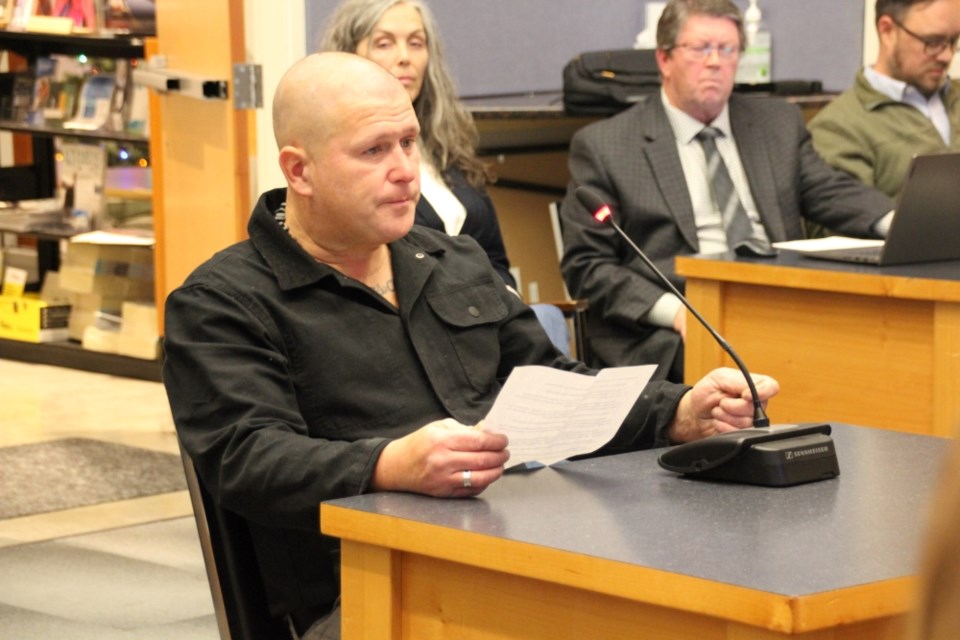A month after the District of Sechelt council passed three readings to amend a bylaw that would fine property owners daily for allowing unauthorized access to vacant land, people who are living in the shelter or were living in a recently-dismantled encampment on private property attended the Dec. 7 council meeting to introduce themselves.
“We’re here tonight to introduce ourselves and to extend an olive branch,” Sean Hill said in his address to council. “We believe that communication is the key to any healthy relationship and we’re hoping that this will be the first of many successful dialogues between our community and city hall.”
Hill lives at the shelter on Wharf Avenue and has lived on the Sunshine Coast for 25 years. He was appointed by the Sechelt Association of the Unhoused to speak on their behalf.
At a Nov. 16 meeting, council passed three readings to introduce a daily fine of $400 to owners of properties that don’t secure vacant land against unauthorized access. Staff said the move was to address a certain property in particular, but the bylaw would apply to all properties in the district.
On Nov. 21, the clear-out of a temporary housing encampment began at an undeveloped lot across from BC Housing’s supportive housing facility on Hightide Avenue.
Hill addressed the myth that homeless people living in Sechelt are from off-Coast, saying that at their group’s most recent meeting, three quarters of those in attendance indentify as long-term residents. He also acknowledged safety concerns, and said they “admit that we can do a better job of holding one another accountable.”
While the delegation did not include a formal ask from council, Hill said they hope to sit down with council to discuss how to work together. “It’s fundamentally important to bridge the gulf of misunderstanding between our two communities,” Hill said.
Coun. Adam Shepherd asked Hill how many people live in the shelter and encampment. Hill said the shelter is at or nearing capacity, but noted the people at Hightide Modular Housing (operated by RainCity) should not be considered as housed, since they’re taking part in a program and not renting.
When asked by Coun. Dianne McLauchlan what his vision is for how to deal with the situation, Hill said the common goal is to get into something more stable. He suggested getting some inexpensive land, perhaps from the District or Crown land, that people could use with trailers or small sheds that include water and other services such as solar — essentially a permitted location for an encampment.
Coun. Donna Bell commended the delegation on sharing their side. “Certainly the community’s hearing that there’s a fear now around their safety, and for you to be here tonight and work toward a solution, I think it’s a tremendous start.”
Mayor John Henderson thanked Hill for coming, and said the Community Safety Task Force has had its formative meeting. “I want you to know that when we talk about that, that’s safety for everybody, including you.”
The task force was formed at the Nov. 16 council meeting, and may include representation from the public. The taskforce, chaired by Henderson and vice-chaired by Rowe, is expected to report back to council by Jan. 31, 2023.
Amendments adopted
Later in the meeting, council adopted the amendments to the property maintenance bylaw with McLauchlan opposed. During discussion around the adoption, Sechelt’s chief building official James Nyhus said the property maintenance bylaw applies to the entire district uniformly and will be on a complain-basis. Where there is unauthorized access to a property, the bylaw can be used to make an owner secure the property. Henderson added that enforcement will be enacted in accordance with the severity or number of complaints.
McLauchlan referenced her background in urban planning and expressed a desire for preventative steps. “I do want bylaws, when people complain, to be enforced. I know we only respond according to complaints, but I do think bylaws should be enforced and if we’re not planning to enforce them, we shouldn’t have them,” she said.
Henderson said they would continue that conversation offline, as it includes an inference he is uncomfortable with.
With files from Connie Jordison




